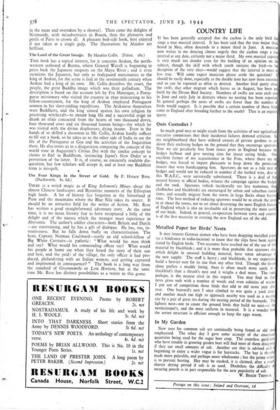THIS book has a topical interest, for it concerns Arakan,
the north- western seaboard of Burma, where General Wave11 is beginning to press back the Japanese outposts on the Mayu River ; and it even mentions the Japanese, but only as bodyguard mercenaries to the king of Arakan, for the scene is laid in the seventeenth century when Arakan had a king of its own. Mr. Collis describes the court, the people, the great Buddha image which was their palladium. The description is based on the account left by Fra Manrique, a Portu- guese missionary who visited the country in 1630 ministering to his fellow-countrymen, for the king of Arakan employed Portuguese seamen in his slave:raiding expeditions. The Arakanese themselves were Buddhists, and the king sinned against his own religion by practising witchcraft—to ensure long life and a successful reign he drank an elixir concocted from the hearts of two thousand doves, four thousand cows and six thousand human beings—for which he was visited with the divine displeasure, dying insane. Even in the hands of so skilled a showman as Mr. Collis, Arakan hardly suffices to fill out a book, so he takes us to the other side of India to see the life of the Portuguese at Goa and the activities of the Inquisition there. He also treats us to a disquisition comparing the concept of the world state in Augustine's Civitas Dei with the similar concept he claims to find in Buddhism, instancing Japan's New Order as a perversion of the latter. It is, of course, an eminently readable dis- quisition, but few scholars will accept it, and at least one Buddhist
term is misspelt. •






















 Previous page
Previous page